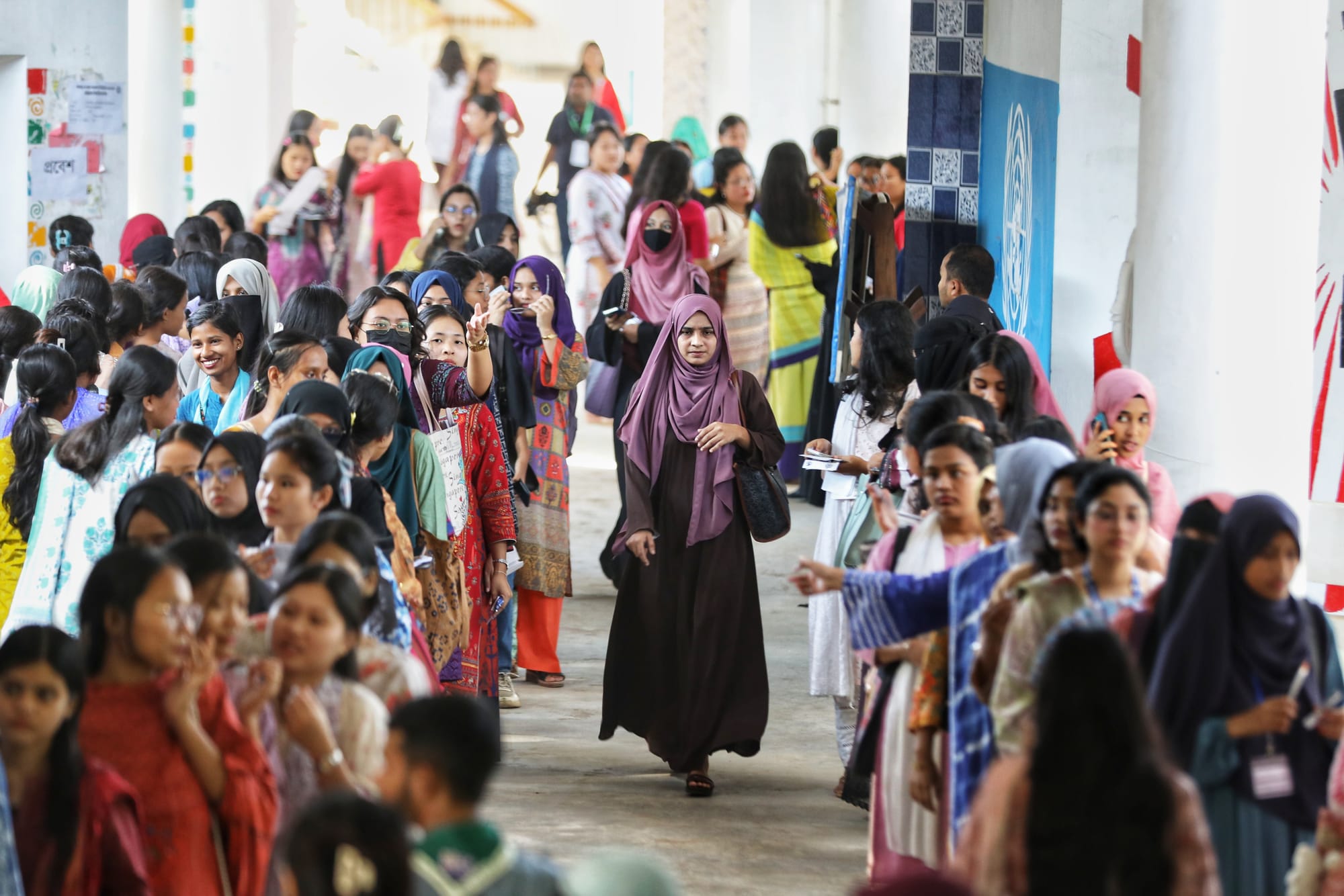Why did the students’ union elections have few female candidates?
Cyberbullying — including slut-shaming and body-shaming — stopped female students from contesting students' union elections at four major universities in the country as the university administrations sat on their hands, the victims allege.

Over a year back, in July 2024, female university students took to the streets in protest against the discriminatory quota system in the government job recruitment and bore the brunt of brutal attacks by the state-backed forces and Awami League’s activists together with their male counterparts.
A year later, as the students’ union elections concluded at all four major universities across the country, from Dhaka to Rajshahi, female students were hesitant to contest as candidates. Only around 10% of the candidates contesting for positions open to all are female, reported the major dailies.
Netra News found that cyberbullying, which includes slut-shaming and body-shaming, particularly targeting female candidates, often using fake or anonymous accounts, is the main reason behind the lack of female candidates in the student union elections.
“I remember there were so many derogatory comments from that fake ID [...] that I decided not to collect the nomination form,” said Sharifa Kalam Tumpa, a student from the University of Dhaka who wished to contest in the election. She recounted how some students using fake profiles posted in some Facebook groups as soon as she posted in a group expressing her intention to contest in DUCSU.
Fouzia Nourin is a student from Rajshahi University, who, despite her initial interests, decided not to contest in the RUCSU election. “Many couldn’t muster the courage. Why would they contest in RUCSU, to be bullied online?” she asked.
“I still have the nomination form that I collected on my table, but could not submit,” said Sufaida Jannat Khuki from Chittagong University, who was discouraged by her father to contest the poll, fearing cyberbullying.
Sharifa, Fouzia and Sufaida are among the dozens of female students who did not contest in the elections, though they were interested, due to the fear of cyberbullying.
Bullying candidates with derogatory comments on social media, often using fake profiles, has become increasingly common and affects candidates regardless of gender. However, women candidates frequently face character assassination attempts and are shamed for their appearances.
Umama Fatema, a female student leader of the July uprising who contested as a Vice-President candidate in the DUCSU 2025 polls, claimed she encouraged girls to contest the elections, but whenever someone wanted to contest in the polls, the bullies would start spreading hateful messages targeting her character.
“In the post-uprising period, women who wanted to take on leadership roles faced character assassination and were subjected to slut-shaming to such an extent that many lost interest in running for office,” stated Rubina Jahan Tithi from Jahangirnagar University. She was elected unopposed to the Begum Sufia Kamal Hall Union, as no other girl was willing to participate in the election.
Body-shaming, which involves targeting an individual for their physical appearance, is a prevalent form of cyberbullying directed at female candidates, according to female students, that also discouraged many from submitting nominations.
Mrittika, a student at Rajshahi University, felt discouraged, particularly because of the numerous comments she saw that descended into body-shaming against her acquaintances, who contested in the DUCSU polls, especially those who would not maintain purdah, an Islamic practice of using a veil and clothes to cover the bodies of women in public. “They would be called Shahbagi,” she said, “then they (bullies) would make comments that I can’t even pronounce in a civilised society.”
Sanjida Ahmed Tonni, the research and publications affairs secretary of DUCSU, shares the same sentiment. According to her, after the uprising, the girls who were at the forefront were bullied for their appearances.
The cyberbullying of women in social media is not only taking a toll on the lives of female students, but also affecting their family members, who discourage them from contesting in the elections.
“She (the candidate) may tolerate it herself, but the family doesn’t really want to accept it,” Fouzia Nourin of Rajshahi University claimed.
Sufaida Jannat from Chittagong University also faced a similar dilemma when her father discouraged her from contesting. “He (her father) explained that if they (the bullies) start bullying you, you would become a target and they would continue time and again,” she claimed. She did not contest the CUCSU elections due to her family’s insistence.
The university administrations, which were supposed to ensure safety for the students, hardly lifted a finger to stop cyberbullying, especially targeting the female candidates, according to the students.
“We’ve been dealing with these with the administration,” said Zahin Biswas Esha from Rajshahi University, who contested as an Assistant-General Secretary at the RUCSU election 2025 and has been a victim of cyberbullying. She claimed she asked the administration to share a guideline regarding cyberbullying, but they never shared any.
Mrittika from the same university thinks the inaction of the university administration is eventually encouraging the bullies to continue with cyberbullying. “These bullying have been happening for a long time, so have the harassments. But the administration did not take any step to stop it,” she said. “It can be said that they indirectly facilitated it. They (the bullies) were thus encouraged.”
Several newspapers reported that the university administrations received complaints of cyberbullying from a number of candidates.
Netra News contacted the administrations of the University of Dhaka, Jahangirnagar University, University of Rajshahi, and University of Chittagong regarding the allegations and their measures to prevent cyberbullying. They did not respond to our queries.●
Iffat Ara Munia, Aaqib Md. Shatil and Mizanur Rahman contributed to the report.